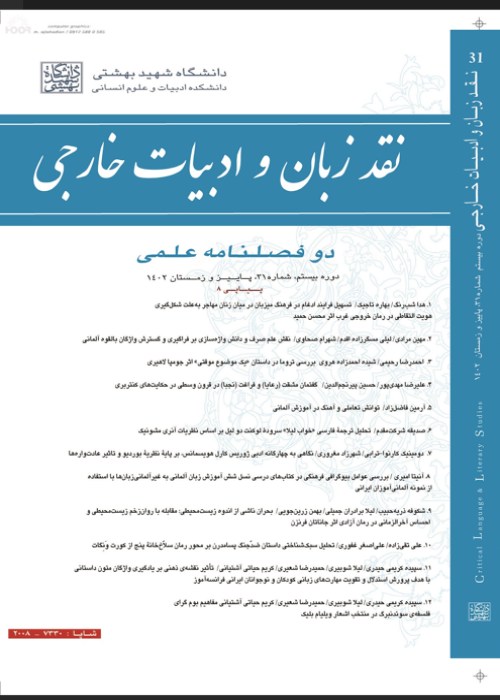The Role of Topological Studies in Language Teaching: A Study Based on Error Analysis in Constructing Relative Clauses
One of the main reasons for the error in the formation of relative clauses (RC) by Persian language learners who are learning German is the use of the relative pronoun to construct RC in German. In German, the relative pronoun agrees in both gender and number with the word it refers to, while Persian only uses the conjunction "ke" which has no syntactic or semantic connection with the RC it makes. The strategies used to construct RC are also quite different in these two languages. Based on the hypothesis of the present study, it seems that most of the errors in the construction of RC in German occur in two parts: On the one hand, there is the incorrect choice of the relative pronoun by language learners, the reason for which may lie in not using a relative pronoun in Persian. On the other hand, another mistake that can be expected is choosing an irrelevant strategy to make RC. Through analyzing the RC used in the present study, we seek to determine the type(s) of frequent errors in the construction of RC and demonstrate that the results of typological studies can improve the process of foreign and second language teaching.
RC in German and Persian have been investigated in several studies. Lehmann (1977), a German linguist, discusses the differences between the construction of restrictive and non-restrictive RC in Persian and how they are shown in the head inside the relative clause. On the other hand, Mahmoudi (2014) deals with the clitic "ye" in the head of RC which functions as an article in Persian. Mahmoudi (2019) also deals with the issue of elements in descriptive RC. Bahrami (2021) has focused on RC in Persian from a typological point of view. In this research, in addition to showing the common strategies in making RC, a comparison has been made with other languages. This study shows that contrary to what is stated in many categories, Persian language uses several strategies in constructing RC.
In order to indicate the type of errors of language learners whose mother tongue is Persian in constructing RC, the teachers of three German language classes were asked to provide the sentences that the students have made in their class exercises. A total of 59 language learners, including 32 female learners and 27 male language learners, participated in this study. The youngest learner was 16 years old and the oldest was 50 years old. A total of 1339 RC were collected and examined in the first phase of this research.
Having examined the types of errors in RC used in the present study, we observed that out of 191 errors, 145 errors were directly related to our research hypothesis. In other words, most of the errors made in RC are due to the differences in typological strategies used in Persian and German. On the other hand, a hypothesis was raised in the introduction of this paper, stating that due to the similarities between the position of the verb in RC and the posterior position of RC in Persian and German, no error is expected in this section. Contrary to this prediction, it was observed that 44 of the errors related to the research question belonged to an error in the position of RC. Also, in 12 cases, errors were observed in the position of the verbs used in RC. In addition, in this study, we also identified other types of errors that are not related to the typological strategies used in the construction of RC.
- حق عضویت دریافتی صرف حمایت از نشریات عضو و نگهداری، تکمیل و توسعه مگیران میشود.
- پرداخت حق اشتراک و دانلود مقالات اجازه بازنشر آن در سایر رسانههای چاپی و دیجیتال را به کاربر نمیدهد.


